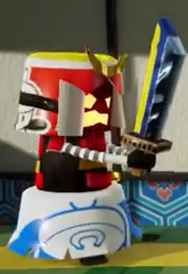Bushydo: Difference between revisions
From the Super Mario Wiki, the Mario encyclopedia
Jump to navigationJump to search
Apikachu68 (talk | contribs) m (→Names in other languages: Name is self-explanatory.) |
|||
| (25 intermediate revisions by 16 users not shown) | |||
| Line 1: | Line 1: | ||
{{species | {{species infobox | ||
|image=[[File:YCW Bushydo.png]] | |image=[[File:YCW Bushydo.png]] | ||
|first_appearance=''[[Yoshi's Crafted World]]'' ([[List of games by date#2019|2019]]) | |first_appearance=''[[Yoshi's Crafted World]]'' ([[List of games by date#2019|2019]]) | ||
}} | }} | ||
'''Bushydos''' are large, samurai enemies that appear in ''[[Yoshi's Crafted World]]''. They are made out of milk cartons. Bushydos attack by slashing their sword onto the ground, allowing [[Yoshi (species)|Yoshi]] to use it as a platform to climb over them, similar to a [[Stairface Ogre]]. They | '''Bushydos''' are large, samurai enemies that appear in ''[[Yoshi's Crafted World]]''. They are made out of milk cartons, and are only found in the level [[The Shogun's Castle]]. Their name is a pun on "{{wp|bushido}}". | ||
==Description== | |||
Bushydos attack by slashing their sword onto the ground, allowing [[Yoshi (species)|Yoshi]] to use it as a platform to climb over them, similar to a [[Stairface Ogre]]. They can be defeated with a [[Ground Pound]] to the head or by throwing three eggs at them, though they eventually revive themselves, much like a [[Dry Bones]]. | |||
The [[Shogun of Skewers]] is made from parts of a Bushydo. | |||
A Bushydo costume can be obtained from the capsule machine in [[Ninjarama]] for 200 coins. | |||
==Gallery== | ==Gallery== | ||
| Line 11: | Line 16: | ||
</gallery> | </gallery> | ||
==Names in other languages== | ==Additional names== | ||
===Internal names=== | |||
{{internal names | |||
|game1=''[[Yoshi's Crafted World]]'' | |||
|file1=<tt>Game/Assets/Characters/Boss/KarakuriArmor</tt> | |||
|name1=KarakuriArmor | |||
|meaning1=Mechanism Armor | |||
}} | |||
===Names in other languages=== | |||
{{foreign names | {{foreign names | ||
|Jap=ブッシーセット | |Jap=ブッシーセット | ||
|JapR=Busshī Setto | |JapR=Busshī Setto | ||
|JapM= | |JapM=Corruption of「武士」(''bushi'', samurai) + English word "set" | ||
|ChiS=武士组合 | |||
|ChiSR=Wǔshì Zǔhé | |||
|ChiSM=Samurai Set | |||
|ChiT=吾氏組合 | |||
|ChiTR=Wúshì Zǔhé | |||
|ChiTM=Wu's Set | |||
|Ger=Bushitoni | |||
|GerM=From "bushi" and English male given name "Toni" | |||
|Ita=Bushi | |||
|Kor=무우사 | |Kor=무우사 | ||
|KorR=Muusa | |KorR=Muusa | ||
|KorM=From 무사 ( | |KorM=From "{{hover|武士|무사}}" (''musa'', "warrior" in Sino-Korean) | ||
| | |Spa=Samurín | ||
|SpaM=Portmanteau of "samurai" and the diminutive suffix "-ín" | |||
}} | }} | ||
{{YCW}} | {{YCW}} | ||
[[Category:Yoshi's Crafted World | [[Category:Yoshi's Crafted World enemies]] | ||
Latest revision as of 15:01, August 30, 2024
| Bushydo | |
|---|---|

| |
| First appearance | Yoshi's Crafted World (2019) |
Bushydos are large, samurai enemies that appear in Yoshi's Crafted World. They are made out of milk cartons, and are only found in the level The Shogun's Castle. Their name is a pun on "bushido".
Description[edit]
Bushydos attack by slashing their sword onto the ground, allowing Yoshi to use it as a platform to climb over them, similar to a Stairface Ogre. They can be defeated with a Ground Pound to the head or by throwing three eggs at them, though they eventually revive themselves, much like a Dry Bones.
The Shogun of Skewers is made from parts of a Bushydo.
A Bushydo costume can be obtained from the capsule machine in Ninjarama for 200 coins.
Gallery[edit]
Additional names[edit]
Internal names[edit]
| Game | File | Name | Meaning
|
|---|---|---|---|
| Yoshi's Crafted World | Game/Assets/Characters/Boss/KarakuriArmor | KarakuriArmor | Mechanism Armor |
Names in other languages[edit]
| Language | Name | Meaning | Notes |
|---|---|---|---|
| Japanese | ブッシーセット[?] Busshī Setto |
Corruption of「武士」(bushi, samurai) + English word "set" | |
| Chinese (simplified) | 武士组合[?] Wǔshì Zǔhé |
Samurai Set | |
| Chinese (traditional) | 吾氏組合[?] Wúshì Zǔhé |
Wu's Set | |
| German | Bushitoni[?] | From "bushi" and English male given name "Toni" | |
| Italian | Bushi[?] | - | |
| Korean | 무우사[?] Muusa |
From "武士" (musa, "warrior" in Sino-Korean) | |
| Spanish | Samurín[?] | Portmanteau of "samurai" and the diminutive suffix "-ín" |
